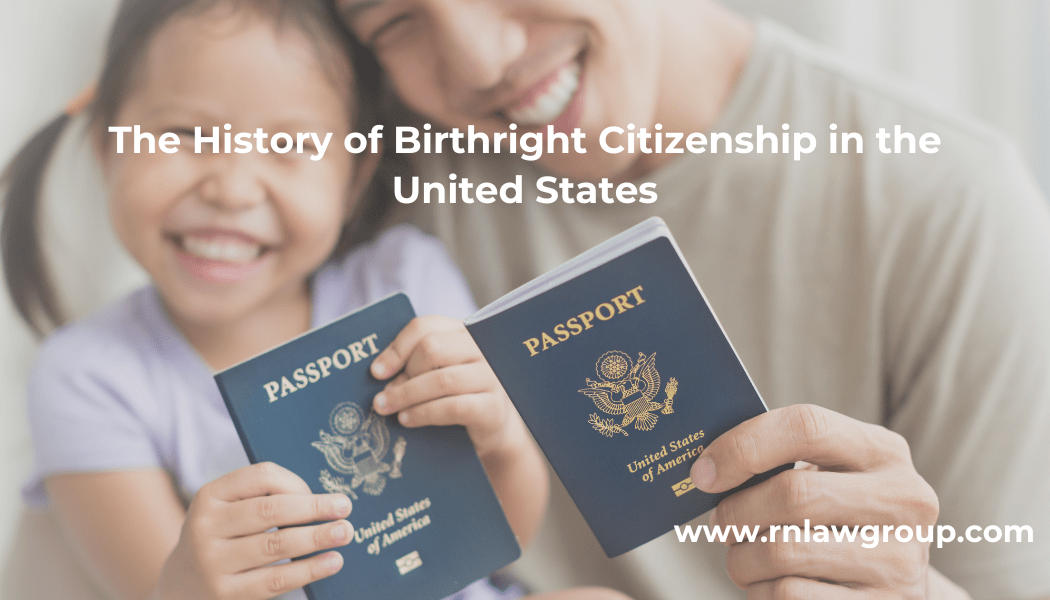
The History of Birthright Citizenship in the United States
Birthright citizenship serves as a fundamental tenet of American democracy, ensuring that individuals born on U.S. territory are recognized as citizens of the United States, irrespective of their parents’ citizenship or immigration status. This principle, established in the Fourteenth Amendment of the Constitution, has played a pivotal role in shaping the national identity, reflecting the values of equality and inclusivity. Nevertheless, the journey toward its recognition and the various interpretations it has undergone have been influenced by historical discussions, legal disputes, and societal changes.
Origins of Birthright Citizenship
The roots of birthright citizenship in the United States can be traced to the common law doctrine of jus soli (“right of the soil”), which was derived from English legal customs. According to this principle, individuals born within the boundaries of a nation were entitled to citizenship or allegiance to that nation. Colonial America adhered to this doctrine, which subsequently impacted early U.S. legislation and court rulings.
However, the U.S. Constitution, ratified in 1789, did not specifically define citizenship. It was only with the Naturalization Act of 1790 that Congress provided a framework for citizenship, albeit restricted to “free white persons” of good character. This exclusionary approach mirrored the racial and social hierarchies of the era and left unresolved issues regarding citizenship for those born in the United States, particularly enslaved individuals, free African Americans, Native Americans, and immigrants.
Pre-Civil War Uncertainties
The period preceding the Civil War was characterized by significant uncertainty regarding the citizenship status of individuals of African descent. This ambiguity reached a critical point with the landmark case of Dred Scott v. Sandford (1857), in which the U.S. Supreme Court determined that African Americans, regardless of their status as free or enslaved, could not be recognized as citizens under the Constitution. Chief Justice Roger B. Taney, in his majority opinion, asserted that African Americans were “beings of an inferior order,” thereby denying them the rights and privileges associated with citizenship.
The Dred Scott ruling highlighted the pressing need for a constitutional solution to the citizenship dilemma. The Civil War, which revolved around issues of slavery and states’ rights, brought these fundamental questions to the forefront of national discourse.
The Fourteenth Amendment: Defining Birthright Citizenship
In the wake of the Civil War, Congress aimed to rectify the injustices stemming from slavery and to guarantee the legal equality of newly freed African Americans. The Reconstruction Amendments, particularly the Fourteenth Amendment, played a crucial role in redefining the concept of citizenship. Ratified in 1868, the Citizenship Clause of the Fourteenth Amendment explicitly nullified the Dred Scott decision by stating:
“All persons born or naturalized in the United States, and subject to the jurisdiction thereof, are citizens of the United States and of the State wherein they reside.”
This clause firmly established the principle of jus soli as the foundation of citizenship in the United States. The phrase “subject to the jurisdiction thereof” clarified that individuals born on U.S. soil, with the exception of children of foreign diplomats, enemy occupiers, or certain Native American tribes, were entitled to citizenship.
The Fourteenth Amendment represented a pivotal change in American law, conferring citizenship upon millions of individuals who had previously been enslaved and establishing the principle of equality under the law as a defining characteristic of the United States. Nevertheless, the interpretation and implementation of this amendment would remain a subject of debate in the years that followed.
Legal Challenges and Clarifications
The phrase “subject to the jurisdiction thereof” underwent scrutiny in various legal cases, influencing the understanding of birthright citizenship. A landmark decision occurred in United States v. Wong Kim Ark (1898). Wong Kim Ark, who was born in San Francisco to Chinese immigrant parents lacking U.S. citizenship, faced denial of reentry into the United States after visiting China.
The Supreme Court ruled in favor of Wong Kim Ark, affirming that the Citizenship Clause of the Fourteenth Amendment extended to nearly all individuals born on U.S. territory, irrespective of their parents’ immigration status. The court highlighted the principle of jus soli as fundamental to American citizenship, establishing a precedent that continues to shape legal interpretations today.
Exclusions and Limitations
Despite the expansive protections offered by the Fourteenth Amendment, certain populations were effectively excluded from birthright citizenship. For instance, Native Americans were not initially recognized as U.S. citizens, as they were considered to owe allegiance to their tribal nations rather than the federal government. It was only with the passage of the Indian Citizenship Act in 1924 that Congress conferred full U.S. citizenship upon all Native Americans born within the United States.
Additionally, the discourse surrounding immigration and national identity during the late 19th and early 20th centuries resulted in policies that indirectly influenced birthright citizenship. The Chinese Exclusion Act of 1882 and other restrictive immigration measures reflected xenophobic sentiments aimed at specific ethnic groups. While these laws did not invalidate the principle of birthright citizenship, they highlighted the underlying tensions related to immigration and citizenship.
Modern Debates and Controversies
In the 20th and 21st centuries, the issue of birthright citizenship has continued to provoke significant political and legal discussions. The Civil Rights Movement of the mid-20th century underscored the relevance of the Fourteenth Amendment in ensuring equal rights, including citizenship, for all individuals. However, as immigration trends evolved, birthright citizenship emerged as a central topic in debates surrounding immigration reform and national identity.
Opponents of birthright citizenship argue that it encourages unauthorized immigration and leads to the phenomenon of “anchor babies,” a derogatory term for children born in the United States to parents who are not citizens. Periodically, proposals to abolish or limit birthright citizenship have surfaced, often intertwined with broader immigration policy discussions.
Supporters of birthright citizenship assert that it is a vital component of American democracy, promoting equality and inclusivity while preventing the emergence of a stateless population. They maintain that changing the interpretation of the Fourteenth Amendment would compromise its historical intent and the nation’s dedication to equal rights.
The International Context
Although birthright citizenship is a hallmark of the United States, it is not a universally adopted principle. Numerous countries adhere to the concept of jus sanguinis (“right of blood”), which grants citizenship based on the nationality or citizenship of an individual’s parents rather than their birthplace. The United States is distinctive in its adherence to jus soli, reflecting its heritage as a nation of immigrants and its foundational ideals of equality and opportunity.
The Future of Birthright Citizenship
The trajectory of birthright citizenship in the United States is expected to be influenced by a combination of legal, political, and social factors. Ongoing discussions surrounding immigration, national security, and social justice will continue to play a significant role, with the principles established in the Fourteenth Amendment highlighting the nation’s dedication to inclusivity and equality.
Birthright citizenship has remained a fundamental aspect of American democracy, embodying the core values of the nation and its ability to withstand various challenges. Its historical context illustrates the changing landscape of citizenship and the persistent efforts to uphold the United States as a land of opportunity for all individuals born within its territory.
By: Karim Jivani
Karim Jivani is an Associate Attorney at Reddy Neumann Brown PC who focuses on employment-based non-immigrant visas. Karim’s practice covers all phases of the EB-1A and EB-2 NIW visa process including filing petitions, responding to Requests for Evidence (RFE), and drafting motions and appeals. Karim has also worked on all aspects of H-1B, L-1, I-140, and VAWA petitions.

